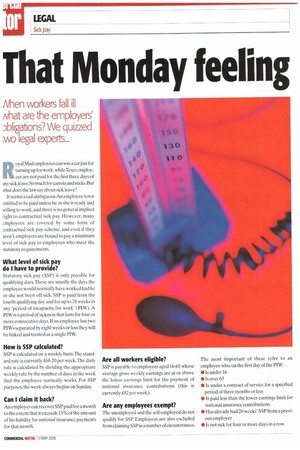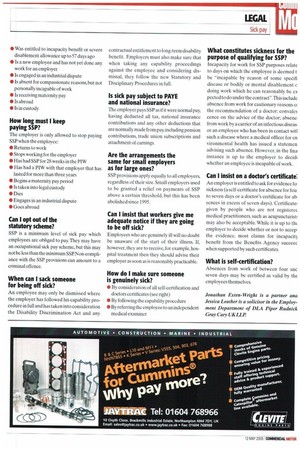That Monday feeling
Page 36

Page 37

If you've noticed an error in this article please click here to report it so we can fix it.
JVhen workers fall ill A/hat are the employers' Dbligations? We quizzed wo legal experts...
Royal Mail employees can win a carjust for turning up for work, while Tesco employees are not paid for the first three days of my sick leave. So much for carrots and sticks. But 'hat does the law say about sick leave?
It seems a tad ambiguous.An employee is not ntitled to be paid unless he or she is ready and gvilling to work, and there is no general implied right to contractual sick pay. However, many .mployees are covered by some form of contractual sick pay scheme, and even if they aren't, employers are bound to pay a minimum Level of sick pay to employees who meet the statutory requirements.
What level of sick pay do I have to provide?
Statutory sick pay (SSP) is only payable for qualifying days. These are usually the days the employee would normally have worked had he or she not been off sick. SSP is paid from the fourth qualifying day and for up to 28 weeks in any 'period of incapacity for work' (PIW ). A NW is a period of sickness that lasts for four or more consecutive days. If an employee has two PIVVs separated by eight weeks or less they will be linked and treated as a single PIVV.
How is SSP calculated?
SSP is calculated on a weekly basis. The standard rate is currently £68.20 per week.The daily rate is calculated by dividing the appropriate weekly rate by the number of days in the week that the employee normally works. For SSP purposes, the week always begins on Sunday.
Can I claim it back?
An employer can recover SSP paid for a month to the extent that it exceeds 13% of the amount of his liability for national insurance payments for that month.
Are all workers eligible?
SSP is payable to employees aged 16-65 whose average gross weekly earnings are at or above the lower earnings limit for the payment of national insurance contributions (this is currently £82 per week).
Are any employees exempt?
The unemployed and the self-employed do not qualify for SSP. Employees are also excluded from claiming SSP in a number of circumstances The most important of these refer to an employee who, on the first day of the PIW: • Is under 16 • Is over 65 • Is under a contract of service for a specified period of three months or less • Is paid less than the lower earnings limit for national insurance contributions • Has already had 28 weeks' SSP from a previous employer • Is not sick for four or more days in a row • Was entitled to incapacity benefit or severe disablement allowance up to 57 days ago • Is a new employee and has not yet done any work for an employer • Is engaged in an industrial dispute • Is absent for compassionate reasons, but not personally incapable of work • Is receiving maternity pay • Is abroad • Is in custody
How long must I keep paying SW?
The employer is only allowed to stop paying SSP when the employee: • Returns to work • Stops working for the employer • Has had SSP for 28 weeks in the PIW • Has had a PIW with that employer that has lasted for more than three years • Begins a maternity pay period • Is taken into legal custody • Dies • Engages in an industrial dispute • Goes abroad
Can I opt out of the statutory scheme?
SSP is a minimum level of sick pay which employees are obliged to pay. They may have an occupational sick pay scheme, but this may not be less than the minimum SSP. Non-compliance with the SSP provisions can amount to a criminal offence.
When can I sack someone for being off sick?
An employee may only be dismissed where the employer has followed his capability procedure in full and has taken into consideration the Disability Discrimination Act and any contractual entitlement to long-term disability benelit. Employers must also make sure that when taking any capability proceedings against the employee and considering dismissal, they follow the new Statutory and Disciplinary Procedures in full.
Is sick pay subject to PAYE and national insurance?
the employer pays SSP as if it were normal pay, having deducted all tax, national insurance contributions and any other deductions that are normally made from pay, including pension contributions, trade union subscriptions and attachment of earnings.
Are the arrangements the same for small employers as for large ones?
SSP provisions apply equally to all employers, regardless of their size. Small employers used to be granted a relief on payments of SSP above a certain threshold, but this has been abolished since 1995.
Can I insist that workers give me adequate notice if they are going to be off sick?
Employees who are genuinely ill will no doubt be unaware of the start of their illness. If, however, they are to receive, for example, hospital treatment then they should advise their employer as soon as is reasonably practicable.
How do I make sure someone is genuinely sick?
• By consideration of all self-certification and doctors certificates (see right) • By following the capability procedure • By referring the employee to an independent medical examiner
What constitutes sickness for the purpose of qualifying for SSP?
Incapacity for work for SSP purposes relate to days on which the employee is deemed t be "incapable by reason of some specifi disease or bodily or mental disablement c doing work which he can reasonably be ex pected to do under the contract".This include absence from work for cautionary reasons a the recommendation of a doctor; convales cence on the advice of the doctor; abseno from work by a carrier of an infectious diseas. or an employee who has been in contact witl such a disease where a medical officer for en vironmental health has issued a statemen advising such absence. However, in the fina instance is up to the employer to decidi whether an employee is incapable of work.
Can I insist on a doctor's certificate
An employer is entitled to ask for evidence fa sickness (a self-certificate for absence for fou: to seven days or a doctor's certificate for ab sences in excess of seven days). Certificate; given by people who are not registerec medical practitioners, such as acupuncturist: may also be acceptable. While it is up to tht employer to decide whether or not to accepi the evidence, most claims for incapacit) benefit from the Benefits Agency succeec when supported by such certificates.
What is self-certification?
Absences from work of between four and seven days may be certified as valid by the employees themselves.
Jonathan Exten-Wright is a partner ant Jessica Leather is a solicitor in the Employment Department of DLA Piper Rudnick Gray Cary UK LLE
























































































































































































































